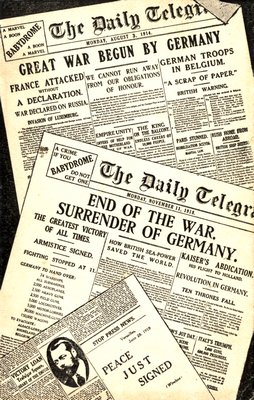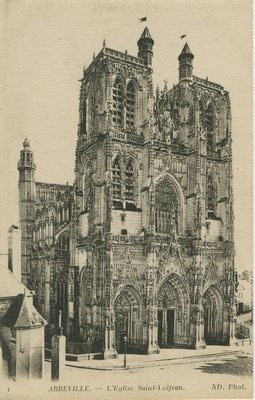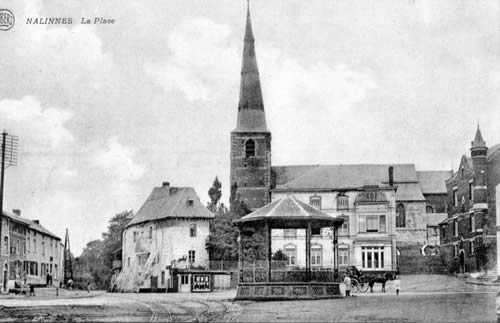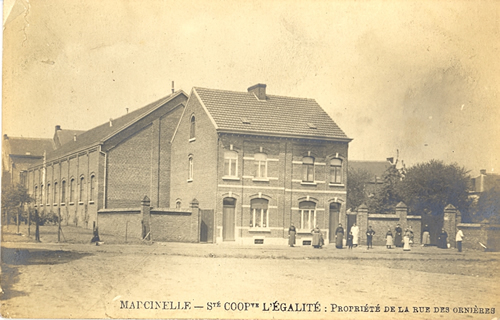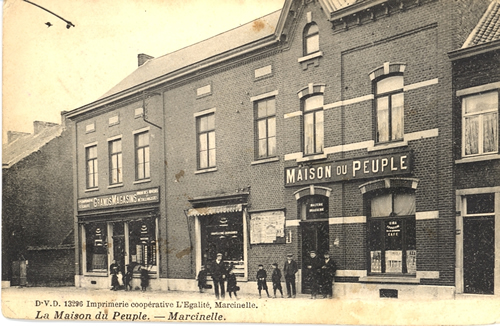Peace!
NOVEMBER 1918
Monday, 11th. The day's work started off with about twenty minutes of extremely regimental ceremonial drill, before going on with the signalling work. The school commandant is Colonel Massie, who is a well-known Australian cricketer.
Major Wilson, the chief instructor of the Signalling Wing, announced that it is officially stated that the armistice with Germany has been signed. The great news that we have been patiently awaiting all these long dreary years, when it did come, scarcely raised a cheer. We were all fed-up with being here, and had no enthusiasm for anything. It was a cold dreary day, which did not tend to make us any more cheerful.
According to today's paper, the Kaiser and the Crown Prince have cleared out to Holland, fearing assassination by their own troops. The king of Wurtemburg and the Duke of Brunswick have abdicated. The socialists have complete control of Berlin. The Belgians are in Ghent, and the British in the outskirts of Mons. Enormous quantities of ammunition and materials have been abandoned by the retreating enemy.
Tuesday, 12th. The armistice terms are published in today's paper. They are very severe, but not so severe as I had expected. The Huns are to withdraw beyond the Rhine. The Allies are to occupy the territories on the left of the Rhine, besides bridgeheads at Cologne, Coblenz, and Mainz, having a radius of 30 kilometres on the right bank of the river. Practically the whole of the German fleet, including submarines, is to be surrendered. Vast quantities of Guns, motor transports, railway rolling stock, aeroplanes, locomotives, and other materials, are to be handed over to the Allies. The Allies will have the right to occupy Heligoland, Kiel canal, and the forts commanding the Cattegat. The enemy is allowed 14 days to be out of Belgium and Alsace-Lorraine. The armistice is to last for 31 days, but may be renewed. All Allied prisoners are to be released at once, without reciprocity. All the German forces have to withdraw from the occupied territories of Russia. The blockade will not be raised.
The Canadians captured Mons before the fighting ceased yesterday morning. The Americans had attacked on the Verdun front, and the battle was in full swing right up till 11o'clock, when the "cease fire" was sounded, and hostilities ceased. Thus, after all these dreary years of waiting and hardships, the Great War has come to an end at last.
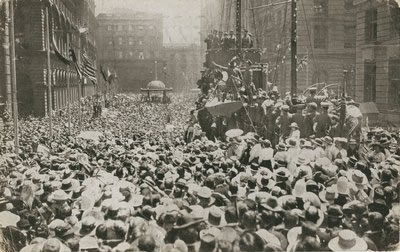 Peace Jubilations Sydney 12.pm 12 Novemeber 1918
Peace Jubilations Sydney 12.pm 12 Novemeber 1918 Wednesday,13th. -----------------
Thursday, 14th. It is persistently rumoured that the Corps School may close down within a few days. Except the Bayonet and Physical Training School, no new schools are coming in.
Friday, 15th. ------------------
Saturday, 16th. Got the 1.30p.m. train from Rue to Picquigny. Went over to Chaussée, to the Bn. P.O. and got a number of letters, including some Australian mail, but none from home. In a letter from Vern, he said he had just come back from leave to Ireland, and is expecting 75 days' U.K. leave in lieu of the 6 months leave granted to the 1914 men. Best of all was a letter from my little girl, in which she says that she is going to keep her promise. That is the answer I've been waiting and waiting for, and now at last it has come, and I am happy.
Dined at the mess, and got a lodging at my former billet. The old lady was very kind, and would not rest content until she had found a mattress and pillow for me.
Sunday, 17th. Alec Stuart went on Blighty leave today. Only for the beastly Signalling School, it would have been me going.
Took the 6p.m. train to Abbeville and found the town gay with illumination. The square was crowded with people, mostly soldiers, and the streets had quite a busy aspect. Most of the buildings were be-flagged. It was a striking contrast to the desolate blackness of the town as I had last seen it, a week ago.
Bought a set of mathematical instruments for 18½ francs.
Walked out to the School, a distance of sixteen miles. It was a moonlight night and frosty, which made walking a pleasure. Pools of water all along the way were frozen over. After the first ten miles I began to get rather tired. Arrived at the School about 2a.m.
Monday, 18th. Stayed in bed all the morning. Orders have been received for the School to carry on as usual. That ends all hope that it might be closed down. Received a package from P.V. Bradshaw with a replica of Bernard Partridge's picture, "The Road to Victory". The prospectus of "The Art of the Illustrator" had been sent previously, but evidently it has gone astray. They will send any section of the work on appro., so I wrote asking for the folios dealing with Bernard Partridge and H.M. Bateman.
Saturday, 23rd. Week almost devoid of interest or incident. On Wednesday I took a day off and went in to Abbeville to purchase a few requirements. Tried to get a copy taken of the photo of Dorrie as a child, but the photographers were already too full-up with work. Coming home I had to walk about twelve miles of the way, as cars were scarce.
On Thursday there came a packet from the P.C.C. with the exercises of Lesson 2. Their comments and criticisms were few. Lesson 3 was also enclosed. They have not returned the exercises of Lesson 1 yet.
Went in to Abbéville this afternoon, to the Field Cashier and drew 300 francs. Bought Hugo's "German Simplified" to learn a smattering of German for when we go up to the Rhine.
Got a car for about eight or nine miles of the way back.
Saturday, 30th. Nothing much to record for the past week. Last Sunday night nearly all the N.C.O's. and men from the 1st. Division packed up and cleared out back to their units. The commandant has been stirring things up a bit in consequence. Several officers who did not get back from their weekend leave till Monday afternoon were placed under arrest. I was fortunate not to be among them, for I had fully intended going to Lille, or else to Paris, for the weekend, and not returning until Monday night. But at the last moment I came to the conclusion that it wasn't quite "playing the game", so decided not to go.
Letters from Dorrie seem to suggest that she is inclined to agree to my proposal that we should marry before the time we agreed upon, if I have to leave for Australia before then. Writing to her on Tuesday night, I offered to release her from the promise she made the last Sunday we spent together, if she still wants to be released from it. Am hoping rather anxiously, however, that the dear girl does not now want to be released from that promise.
Yesterday I wrote to Captain Sellick and enclosed an application for my English leave pass to be sent here so that I can get right away as soon as the school ends, on December 21st. If they send it, I might after all be able to spend Christmas with my dear, ------ -----. Sent to Betty and Wilf the souvenir spoons I got for them at Amiens recently.
DECEMBER 1918
Saturday, 7th. Another tiresome week gone. Only two more weeks at this beastly school, and then perhaps leave to Blighty.
Finished Drawing Lesson 3 and sent it to the P.C.C. last Monday. On Tuesday from P.V. Bradshaw came the two folios I had asked for. I was rather disappointed with them. Kept the Bateman one and returned the other. There is not enough in them to warrant the prices charged, 10/6 each.
During the week I received two parcels from Australia, one from Mrs. Rex, Bert Newland's aunt, containing sox and chocolate, and the other from the City Temple. It was full of good things, including pudding, fruit, sweets, sox, and various other things, but did not contain a note or a message. Perhaps, though, a separate letter was sent and has not arrived.
On Wednesday afternoon some W.A.A.C's. came over to our weekly sports. A team of them played a team from the P.& B. F. school at basketball. They say it was very amusing. I didn't bother going to the sports, but stayed in and made a pencil copy on brisket board of the rough sketch of Corbie cathedral that I made last August.
On Thursday my promotion to Lieutenant appeared in A.I.F. orders. The same day I got a letter from Dorrie declining to accept the release from her promise. So now all is well.
This afternoon and tonight I got most of the inking in of the sketch of Corbie cathedral completed.
Saturday, 14th. Finished the drawing of Corbie cathedral last Sunday. On Tuesday I got a letter from Captain Ball in reply to the one I wrote him recently. He mentioned that leave is pretty scarce. The battalion were at a village called Boulogne, which is somewhere near Avesnes, but were expecting soon to move close to Charleroi, in Belgium.
The practical examinations for the Signalling course commenced on Thursday. We are to have the written examinations next week. On the same day I wrote to Captain Ball. Asked him to jog Sellick's memory about my leave pass.
This afternoon I went in to Abbeville. Went to the Field Cashier and drew 50 francs. Bought a supply of bristol board for my Drawing lessons. Had tea at the club, and was lucky enough to get a car from there right to Forest Montiers. On the way we narrowly escaped a collision with another car, neither having lights on. Have been feeling unwell all day, and the seven mile walk from Forest Montiers to the School proved a very tiresome effort.
There was a decent little bundle of mail awaiting my return. It included a letter from Mum, Sept. 29th., the first I've had from home for six weeks. They were all pleased at home over the good war news. My increased allotment had not come to hand. A packet from P.V. Bradshaw contained a coloured reproduction of Somebody's work. There were two packages from the P.C.C., one containing Lessons 5 to 8, and the other with Lesson 1 returned with comments and criticisms, which were mostly very favourable. Lesson 4 was also enclosed.
Dorrie is very eager for Christmas and my leave, and the jolly times we are going to have. It will be horribly disappointing to both of us if I can't get over in time for Christmas.
Sunday, 15th. Commenced Drawing Lesson 5 today. Had to skip Lesson 4 on account of not being able to get any lithographic chalk.
This evening I went to the cinema show in the courtyard of the farm. The main picture was a lovely Irish piece. Molly, the girl, was a beautiful impish sprite with wicked eyes and lovely hair. The story was most interesting and amusing throughout, and is one of the best I've seen.
Monday, 16th. Examinations continued today. A list of V.C's. in today's paper contained Lieut. Towner's name, who was with my company in the battle of Mont St. Quentin, where he earned the great distinction.
Tuesday, 17th. We had the written examination on electrical subjects this morning. Of the complete list of 32 V.C's. published, 10 are Australians. That is some testimony to the valour of the A.I.F. The papers still continue to make no end of a fuss over Wilson, as though he were a greater man than LLoyd-George or Marshall Foch.
Wednesday, 18th. Written examinations on general subjects this morning. I did not do too well at it. For yesterday's paper I got 69 marks, 66 being a pass.
Thursday, 19th. A nice letter from Clytie today contained a couple of views of "The Haven". It looks a nice comfortable little place. No sign of leave pass yet.
Friday, 20th. We leave here on Sunday. The Corps School is finished now, and will henceforth be discontinued. The camp here will be used in connection with the educational scheme.
The Signallers are having a dinner at a hotel in Le Crotoy tonight. Didn't bother going because a non-drinker is usually like a fish out of water at such gatherings.
Leave pass hasn't come. Wrote a short letter to Dorothy saying that, if I'm not over by Christmas Day, she will know that I've gone back to the battalion, in which case I'll not get across till January.
Saturday, 21st. No parades today. Spent the day working on the last exercise of Lesson 5, but did not get it quite finished. We leave this camp fairly early tomorrow. The leave pass did not come. Wrote a short letter to Dorrie to let her know I'm not coming. Packed up my belongings ready for departure.
Sunday, 22nd. At about half-past nine this morning we marched out of camp, to Rue, about four miles distant. Then there was the usual delay. The 10.40a.m. train did not arrive until about 1.30p.m. We had a deadly slow trip to Etaples, fifteen miles, the train being frequently held up for quite a long time. These lines are so congested and the trains following so close one after another that if a delay occurs anywhere it effects the whole train service for a hundred miles around, and farther.
We arrived at Etaples about eight o'clock at night -- six and a half hours to go fifteen miles! The journey ended there for the time being, so we had to go to the rest camp and dig in there for the night. We were told the train leaves for Calais at 7a.m. tomorrow. Got a decent meal and fairly comfortable beds. Some of the officers celebrated the occasion by getting drunk and creating the usual rowdyism, which resulted in the abolition of sleep till after midnight.
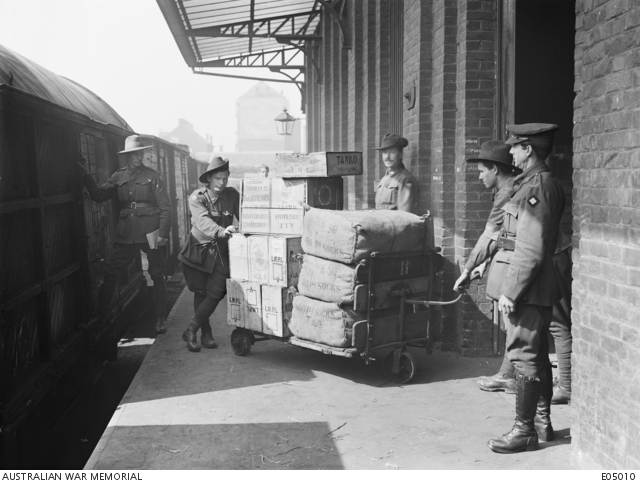
Monday, 23. Missed the early train to Calais, and soon found that everybody else had also missed it. We had depended on it keeping up the reputation for being late, and it left on time! The R.T.O. said that a leave train for Charleroi was due to arrive from Boulogne at twenty past ten. Strolled up the town several times to fill in time.
The train arrived in the afternoon about three o'clock. It was already pretty late, but we managed to find sufficient room for all hands. The travelling was fairly decent until we got near Arras. Then came long stops and slow going.
Tuesday, 24th. Arrived at Arras at about 2 a.m. Some English officers got out there, leaving Scarborough and I with the compartment to ourselves, so that we were able to get a little sleep.
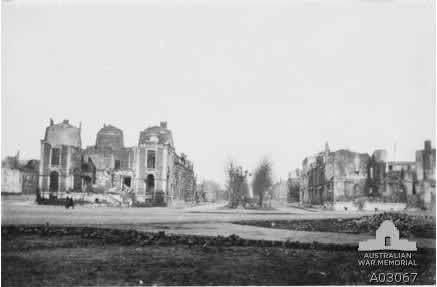 The ruined town of Arras in France, just after the armistice. AWM
The ruined town of Arras in France, just after the armistice. AWM
Passed Douai some time later. Then morning came, and we continued to crawl painfully across the devastated areas, arriving at Valenciennes about noon. The town looked to be pretty badly knocked about in places. Great piles of scrap iron were left where the Germans had collected it ready to take away, corrugated roofing, broken machinery, and all manner of odds and ends of metal.
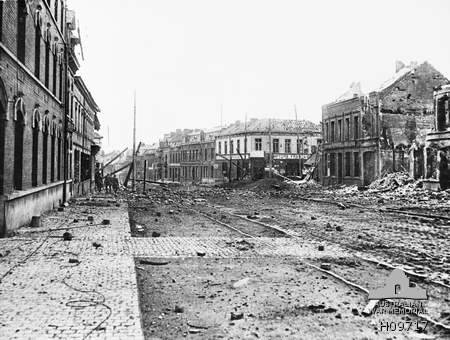 Valenciennes, France. c. 1918. Three British Army soldiers working along the left
Valenciennes, France. c. 1918. Three British Army soldiers working along the left
footpath of a suburb during the capture of the town from German Army forces.
German snipers were still active in the area. AWM
Arrived at Mons about 3p.m. It does not seem to have suffered much damage. The railway station is a fine large building. We were delayed there for the rest of the afternoon, and some of the railway officials told us some awful tales of Hun cruelty during the occupation.
We steamed out of Mons as dusk was setting in, and arrived at Charleroi about 8p.m. It was now snowing lightly but steadily. It was a pleasure to get a glimpse of a fair-sized well-lit town again, after being stuck away in the wilderness near Rue for so long.
We reported to Corps Wing, and were sent from there to Division Wing, to stay the night. The 24th. Bn. is at Nalinnes, about ten kilometres away.
Wednesday, 25th. Christmas Day. Went in to the station at Charleroi, but had to wait till half-past ten to get a train to Nalinnes. Strolled up the town in the meantime. Many shop windows displayed posters bearing the inscription "Welcome Tommy, we never doubted to see you again". Quite a lot of buildings were still be-flagged. Everything in the shops was very dear. Eggs were marked up at 1½ francs each. There was some very fine lace to be seen in some of the windows, but the price - hush!
Got the 10.30a.m. train to Nalinnes. On the way someone told me that George Ingram had been awarded the V.C. At last our battalion has got one of the coveted crosses. That is, indeed, something for us to be proud of.
Arriving at Nalinnes, I went straight to the mess, it being lunch-time, and was greeted with the usual vociferous chaff and good-natured banter. Was pleasantly surprised to find Viv there. He has been back since early this month. I found it a real genuine pleasure to be back amongst the boys again after my six week's exile.
Frank Sellick told me that I can go on leave on Sunday. That will be something pleasant to look forward to for the next few days. Might possibly get to Andover in time for New Year's Day.
Got a very nice comfortable billet with a Belgian family. Elvire, a pretty little girl of seventeen from next door, came in frequently and kept the house alive with her merriment and lively spirits.
We had a big Christmas spread at the mess tonight. There were about eight or ten courses altogether, I lost count of them after a time. The banquet started at half-past six and lasted four hours. Many of the officers were half intoxicated before it began, and the abundance of wine, champagne, and various other drinks provided extra inducement for rowdyism. There were some wild alcoholic songs and choruses. Some of the men took to throwing food at each other. The band was in attendance, and a corporal who sings beautifully entertained us with some fine songs. There was the usual speech-making, in which Viv took part by proposing the toast to "Our Ain Folk". I did not enjoy the dinner very much on account of the drunkenness and rowdyism, and was glad to get away when it was over. The following account of the dinner in "The Red and White Diamond", our battalion journal, describes it well.
The officers' Christmas dinner, held on Christmas night in the banquet hall of the Nalinnes chateau, surpassed any previous event of its sort in the history of the Battalion officers' mess -- winning by a head perhaps from the famous Le Transloy dinner of July, 1917.
At 6.30p.m. 54 officers sat down, and one glance at the artistic and lengthy menu dispelled all doubt -- if any doubt there had been -- as to the probable quality of the dinner. At each diner's elbow lay a bon-bon cracker, and those of us who were childishly eager to pull our crackers were soon satisfied. The colonel set the ball rolling by inviting the "Beer Emma" (Brigade-Major) to pull his cracker with him. Immediately there followed a crackle around the table, and each of us donned the paper hats contained in the bon-bons. Then we settled down. Maybe I should say that most of us settled down, for the barman had been working like a Trojan in the ante-room all the afternoon!
The various courses followed with bewildering rapidity. (We know what they were, because most of us, at any rate, kept our menus.) Amid the general babble of camaraderie which prevailed, we drank each other's health, and also those of many others who unfortunately were not present.
In due course followed the toasts. After "The King" had been drunk in the traditional manner of the Service, cigars and cigarettes were produced. Then, feeling at ease with all the world, we sat back to listen to the remaining toasts on the programme.
"The C.O. and Battalion" was proposed by Captain MacNeil, M.C., who spoke well and eulogistically of our Colonel's sterling qualities. The C.O. (Lieut. Col W.E. James, D.S.O. and bar) responded in his characteristically clever and sincere manner. Then followed "Our Fallen Comrades" by Captain Sale, M.C. "Fred" spoke a few words and proposed that the toast should be a silent one. This was accordingly drunk in renewed silence, which after all was more eloquent than words could be.
"Ain Folk" was proposed by Captain E.V. Smythe, M.C. "Mouquet" surprised most of us by delivering a very sentimental and eloquent little speech, in which he handled the sacred toast as it has very seldom been handled in our mess.
Now we come to perhaps the star performance! The Major called on Captain A.A. Ball, D.C.M., to "tell us off". "Tonto" accordingly hoisted his 8st.6lbs on to his chair, and then, working methodically (strange for him!) around the table, dealt with every officer individually. He spoke continuously for ninety minutes, and spared no one. "Tonto" had anecdotes to tell of each of us -- some embarrassing, some not, but all amusing to the gathering. When one considers that there were 54 officers present, and also that the task imposed upon "Tonto" was an entirely impromptu one, the extraordinarily clever and versatile way in which it was carried out is doubly striking -- even though the performer was "Tonto"!
Throughout the evening the band rendered a programme of music. During the intervals between the band's items Corporal Loveless rendered some excellent songs in his best style. The whole dinner was an unprecedented success, befitting the auspicious occasion of Christmas 1918.
Thursday, 26th. Viv came to my billet this evening, and we had some music and dancing, Ester playing the piano. Rickman came in and assisted with his violin. Ester and Elvire# sang some French songs for us. We spent a very pleasant evening.
Friday, 27th. Weather freezing today. We had another pleasant evening, with music and dancing.
Saturday, 28th. Raining today. Borrowed Baldock's leather travelling bag to take with me tomorrow on leave to England. Had just begun to pack up some of my things, when an orderly came to tell me I was to go this afternoon, travelling by the Cologne express. Got the leave warrant at the Orderly Room, had lunch, and arranged to go in to Marcinelle in an ambulance car that was going in.
Packed up hurriedly. Forgot to take my dress boots. Had a very wet and splashy ride in to Marcinelle. At Divisional Hqrs. I got a coupon entitling me to travel by the express. Strolled round Charleroi to fill in time. The express was an hour late getting in. It is a converted hospital train, and is fitted with bunks provided with palliasses and blankets. When the train got well on its journey we turned in to our bunks, to enjoy a comfortable sleep.
Sunday, 29th. Progress during the night was slow. We were due at Boulogne at six o'clock this morning, but at ten o'clock we were not as far as Valenciennes. We crawled along by fits and starts all day. Wormed our way into Arras about four in the afternoon, and St. Pol saw us at eight o'clock at night. Having passed the devastated area, the going was better after that. Turned in and got some sleep.
Monday, 30th. Arrived at Boulogne about 2a.m. The Baggage Room was "full up", so we had to leave our belongings stacked outside in the main waiting room and chance the consequences. A French railway official undertook to stay and watch them, "for a consideration". One or two others collected "considerations" for being in the vicinity or for looking on or something or other.
Went up to the Officers' Club and had breakfast, which is on at all hours. No rooms or beds were available at the Club. Even all the chairs and lounges were taken. Went up to the railway station about five o' clock and found it crowded with civilians, people travelling early to work. The man who had undertaken to stay and watch our baggage was nowhere to be seen, and all our things were out in the crowded hall at the mercy of any thief who might happen along. Stayed there for some time to keep an eye on them, and then, as a lot of luggage had been taken from the Clock Room in the meantime, I put my travelling bag and pack in there. Walked about for awhile, having nothing to do. Went along to the wharf about seven and ascertained that the embarkation would commence at half-past eight.
Went up to the station about eight o'clock to look after my luggage. Had to line up in a long queue at the R.M.T.O's. office on the wharf. Got aboard the leave boat at last.
The boat left Boulogne at half-past nine. The sea outside the harbour was a bit inclined to be rough, and a few men were sea-sick. Feeling somewhat squeamish, I lay down on the deck, which was wet, with my pack for a pillow, and stayed there till we arrived outside Folkestone. Picked up a bit of a cold in consequence.
We were across the Channel in an hour and a half. Got a through train from Folkestone to Victoria. It was good to be able to look out over the countryside and realize that it was England. At Victoria, with some difficulty I managed to persuade the cloak-room attendant to find a place for my belongings in his overcrowded sanctuary.
Went to Horseferry Road and drew £90. Got a decent pair of boots and a decent hat at Ordinance Store in order to look respectable. Returned to Victoria, collected my luggage, and went out to Hounslow. Mrs. Morgan was in at 44. They were all surprised to see me come in.
It was nice to feel oneself at the right end of the journey. Mrs. Morgan had some home mail for me, a letter from Gordon asking for a description of a battle, a book of Hudson's cottages, probably sent by Viola, a Christmas parcel from the Gladesville Presbyterian church with a note from the Rev. Chalmers included. Mrs. Morgan had sent some more home letters of mine on to Andover, thinking I would probably go direct there.
Spent a very pleasant evening in at Mrs. Caborn's, where we had supper.
Tuesday, 31st. Left my war souvenirs, etc., at Mrs. Morgans. Went in to London, to the Strand, to dig up some Christmas presents. Got a nice little leather travelling bag for Dorothy, a book each for Betty and Wilf, and a pair of silver-plate vases for Mrs. Jewell.
Got the 3.15p.m. train from Waterloo to Andover. Dorothy and Betty were at the station to meet me, and I went up home with them. There were five home letters awaiting me, two from Mum, one from Dad, one from Ida, and one from Mr. J. Clydesdale, of the Church of Christ Mission Society. Mum had received my increased allotment money. Ida had got a position for one month on Red Cross work, as a typist, at £2 per week. She had made up her mind to be baptized, with a couple of girl friends, at the Bexley Baptist Church. Her letter was the usual cheery one she writes. Mr. Clydesdale had lost his youngest son killed in France.
After tea, Dorrie and I came down town, and I got a room at Blake's Temperance Hotel, at 2/6 per night. Spent a very happy evening at Mrs. Jewell's, with my little girl. Stayed till nearly midnight.
JANUARY 1919
Wednesday, 1st. New Year's Day. Took my stock of Christmas gifts up to Mrs. Jewell's. They were very pleased with them. Dorothy was delighted with the bag.
Mrs. Jewell is in difficulties about her house. The owner, Mrs. Adams, wants to come back into it now that her husband may be demobilized any day. She only let it on that condition. Houses are very scarce in Andover, and there appears to be little chance of getting one.
Spent an idle pleasant day. Miss Smith came in the evening, and we played bridge till pretty late. It was well after midnight when I got back to the hotel, and Miss Blake was very cross with me for keeping her up so late.
Thursday, 2nd. Miss Blake gave me the key of the door today, so that I could come in at any hour. Dorrie and I went to the cinema tonight, but the pictures weren't up to much.
Friday, 3rd. There were some advertisements of houses to let in the local paper today. I wrote to two for Mrs. Jewell. Another place was advertised by Dorothy Bryan's father at Ludgershall. Dorrie and I went over there this afternoon and walked over to Perham Downs to find Mr. Jewell and let him know about the place, so that he could see Mr. Bryan about it. It was a rainy miserable day, so I left Dorrie with the girls at No.8 canteen and went and hunted up Mr. Jewell. Afterwards, we had some afternoon tea at No.8 canteen, and returned to Andover by the 5.30p.m. train. Played bridge till pretty late, and spent a very enjoyable evening.
Saturday, 4th. Having heard of a vacant house in Salisbury Road, Dorrie and I went round there, but found it already taken. We had to stay indoors this afternoon, as it was too wet to go out.
Sunday, 5th. We went out to Mrs. Pither's at Charlton this morning. Couldn't go out this afternoon, as it was too wet.
This evening we went to the Wesleyan Chapel, Beatrice coming with us. Afterwards, Dorrie and I went out for a pleasant walk along the Salisbury road. Stayed at her place till pretty late.
Monday, 6th. The weather being a little better today, Dorrie and I went for a stroll around the Ladies' Walk this afternoon. It was quite a novel pleasure to see the sunshine again, and it was good to be able to get out of doors. We played bridge till pretty late tonight.
Tuesday, 7th. Wrote to Mrs. Morgan saying we would come up to London on Wednesday or Thursday. We strolled around the Ladies' Walk again this afternoon. Spent most of the evening playing bridge again. Mr. Jewell is getting quite affable and friendly. Dorrie and I will probably go to London tomorrow.
Wednesday, 8th. Told Mrs. Jewell today that Dorrie and I wanted to be married in June. She said she would never consent to it. She reckoned Dorrie is far too young from a health point of view. She seemed painfully surprised that Dorrie had definitely decided to come to Australia. She would not listen to reason, so it was useless to try to argue with her.
Dorrie and I got the 1.20p.m. train to Waterloo. Arriving there, we left our baggage at the cloak room and took the tube to Charing Cross. We strolled up to Trafalgar Square, then down to the Houses of Parliament and Westminster Abbey.
Returned to Waterloo for our luggage and went out to Hounslow. Mrs. Morgan appeared pleased to meet Dorothy, and welcomed her warmly. We spent a very pleasant evening there. Dorrie wrote to Elsie's mother for her address so that we can go and visit her and Nap.
Mrs. Morgan had fixed up "my" room for Dorothy, so I slept in at Mrs. Caborne's.
Thursday, 9th. Little Eileen and Vivian invaded my room early this morning for a romp on the bed. They are such dear little kiddies.
Afterwards Dorrie and I went in to London, taking a bus from Hammersmith to Piccadilly and passing the magnificent Albert Memorial en route. Booked a box at the Prince of Wales Theatre for tomorrow night, all the seats having been taken. Also booked a couple of stall seats at the Playhouse for tonight.
We called in at a photographer's shop in the Strand and had Dorrie's photo taken. Then we walked on down the Strand and went through St. Paul's Cathedral. Holman Hunt's picture, the beautiful sculpture, and the tombs in the crypt were all very interesting.
In the afternoon we went out to the British Museum, which is now open. Several rooms contained some very interesting old relics of sculpture. In one room there was a model of the Greek Athenium. The mummy room was closed, but a fine collection of Egyptian sculpture was well worth seeing. It contained, among other things, two huge doorway pillars of stone, with man-headed lions carved in bas-relief. The Natural History museum, an attendant told us, is at South Kensington.
Went to Daly's Theatre to book seats for "The Maid of the Mountains", but nothing cheaper than a £2-5 box was available, and that was rather beyond my limited means. We went to the photo shop in the Strand and got the photos of Dorrie. They had turned out very well indeed, the best I've seen of her, and yet they hardly do her justice.
After having dined at the British Cafe, we went around to the Playhouse. "The Naughty Wife", featuring beautiful Gladys Cooper, was very interesting and amusing, and not at all improper, as one might be inclined to think on account of the name. Gladys displayed some lovely dresses, while Hawtrey, the "husband", showed some excellent acting.
When coming out after the play, I met Roy McPhee at the cloak room. He had got theatre leave from Wandsworth Hospital for the evening. Asked him to come out to Mrs. Morgan's on Sunday.
We got home rather late and somewhat tired.
Friday 10th. Dorrie got a postcard this morning from Mrs. Thompson giving Elsie's address at Thornton Heath. We decided to go out there tomorrow afternoon.
We went into London and hunted up Spon's warehouse. Got four electrical books for Jenkins, and ordered Poole's Telephone Handbook for Viv.
Came out to Victoria this afternoon, and ascertained that my return leave train goes at 7.30a.m. on Monday. We wanted to go through the Tate Gallery, but found it closed. It was too late to think of going to the South Kensington museum, so we returned to Charing Cross and dined at the British Cafe.
Going to the Prince of Wales' Theatre, we met Mrs. Caborn and May with whom we had arranged to share the box. The "box" turned out to be a very small one, not large enough to accommodate the four of us with any degree of comfort. "Fair and Warmer" was an amusing farce, after the style of "A Little Bit of Fluff", with the usual domestic complications. May enjoyed it immensely, and it was as good as a play just to see her laugh.
Coming out from the theatre, we got separated somehow from May and Mrs. Caborn. We also got a bit mixed up with the streets, but eventually got back to the Strand by some long roundabout way. The late trains were packed full with theatre-goers making homewards, and we had a rather uncomfortable ride home.
Saturday, 11th. Dorothy has definitely decided that we shall be married in June as originally arranged, whether her parents consent or not.
We got in to London about midday, just as the shops were closing. It was too late to do any shopping, so we went to the British Cafe and had lunch.
A large demonstration of discharged soldiers marched up through the Strand to Trafalgar Square. They carried banners inscribed with the subjects of their grievances. A typical banner bore the inscription, in large capital letters: "Work, Pensions, or Trouble".
We got a bus from Trafalgar Square to Thornton Heath. It took us there by a long roundabout way, through Streatham. On the way out, we decided to play a practical joke on Elsie and Alf. Dorothy was wearing a ring of her grandmother's which consisted of a plain gold band with a shield on it. By turning it round so that the shield was on the inside of the band, it looked just like a wedding ring. So we thought we would "sell" Elsie and Alf for awhile, and pretend that we were married.
We arrived there about four o'clock. Elsie was away shopping, but came in a little later. They have got a very nice little home, and they both seem to be very happy. The "marriage" joke passed off quite easily, too easily in fact, for they took it quite seriously, and then we were afraid to disillusion them lest they should be angry over it. We had tea with them, spent a very pleasant evening, and stayed for supper. We happened to have my drawing of the Corbie Cathedral in Dorrie's bag, and, as Elsie and Alf seemed to like it very much, we gave it to them as a wedding present. They were more than delighted. Elsie even came over and kissed me, much to my discomfort, especially as Dorothy promptly retaliated by kissing Alf.
We left about nine o'clock, and got a train to Victoria. Had a bit of a quarrel on the way, but it did not last long. Arrived back at Mrs. Morgan's about half-past ten. Dorrie and I stayed up pretty late, long after Mrs. Morgan had gone to bed.
Sunday, 12th. Slept in till after nine this morning. After a late breakfast, we came in to Mrs Caborn's, and had some music and singing.
Took a few snaps of Dorrie and the children in Mrs. Morgan's front room this afternoon. We spent a quiet afternoon together, had tea at Mrs. Caborn's, and then took our departure from Hounslow.
Dorothy left by the 7.10p.m. train from Waterloo. This brings our happy holiday to a close. We had some really happy times, although the weather partly spoilt things, as it rained nearly every day. We are now quite decided about our marriage in June, and we have arranged to spend a week of our honeymoon at Lynton and Lynmouth, a few days with Mrs. Morgan, and a few days with Elsie and Alf.
Went back to Victoria, rather oppressed with that "End-of-a-perfect-day" sort of feeling. Went to the Officers Club and got supper and a room there for the night.
Monday, 13th. Left Victoria by the 7.30a.m. leave train to Folkestone, arriving there about ten o'clock. The boat was not due to sail till 1.15 p.m., so I strolled up the town in the meantime. Went into the museum, and soon lost myself amongst some wonderful fossils. There were petrified remains of all sorts and sizes of sea-shells, and of various kinds of fishes, including the octopus. There were flint and other hard stones cut through the centre and polished, to show the form of some prehistoric fish or other creature that had formed the nucleus of the stone. The collection was extremely interesting, and I was sorry I could not spend more time there. Besides the fossils, there were some weird and interesting things preserved in methylated spirits, including huge scorpions up to seven inches in length. While there I had a very interesting talk with the attendant, who told me lots of things about the fossils, how and where they got them, etc.
Bought "The Blue Lagoon", by H. De Vere Stackpoole, at a bookshop. Got aboard the boat at about half past one, and she sailed at two. Had dinner on board, and then, having a sort of feeling as thought my head and stomach had changed places, I lay down on a lounge and read "The Blue Lagoon" till we got to Boulogne.
Got ashore, went to the railway station, and booked a berth on the Cologne Express leaving at 7.30p.m. Went up town and got a glass put on Viv's watch. Discovered that I had come away from Hounslow without my Sam Browne belt, so wrote to Mrs. Morgan asking her to send it on.
Left Boulogne by the 7.30p.m. express. Continued reading "The Blue Lagoon". and finished it about 11p.m. Didn't like the way it ended.
Tuesday, 14th. Had a fairly decent trip this time, arriving at Charleroi about four in the afternoon. Got a train out to Nalinnes, and arrived at the mess in good time for dinner. George Ingram was there wearing his Victoria Cross ribbon. Quite a number of officers were wearing the 1914-15 service ribbon.
We had an "Au Revoir" dinner to Bill Gow and Newton Calvert tonight, as they are going away with a draft for Australia tomorrow. Horry Clough, Sedgwick, and Bert Baxter left with a draft during my absence.
Viv is on a job at Thy-le-chateau, a village a few kilometres away, in charge of the men attending the technical classes run by the 6th. Field Engineers.
Wednesday, 15th. The draft for Australia marched out this afternoon. It was a wet and miserable day for their departure.
Thursday, 16th. Resumed work on my drawing lessons today. Have been warned to relieve Viv tomorrow at Thy-le-chateau, as he is going to a Corps Electrical School at Namur.
Viv came over to Nalinnes this afternoon. He had six letters for me which had come while I was away on leave. One was from Mum, dated Nov. 17th. They had had great rejoicings in Sydney on the day of the Armistice. The other letters were from Clytie, Olive Watts, with congratulations on engagement and commission, Miss Burke and two from May Curtain, one containing a card with Christmas greetings. In Corowa they had carried on with celebrations for three days and nights when the armistice was signed. Jack Ryan was back in Corowa again with one arm off.
Viv told me that Vern and Mary were to leave for Australia on the "Orsova", which sailed on the 6th. of this month. The "Orsova" is the old boat I came over to Egypt in three and a half years ago.
Friday, 17th. Went over to Thy-le-chateau this afternoon and took over from Viv. Am billeted in an estaminet, but it is a pretty quiet place. By today's mail I got a Christmas parcel from Mr. C. Newland, Sussex St. Sydney. I expect he is Bert Newland's father or brother or other relation. There were some sweets, cake, pudding, tinned goods, and various other good things in the parcel.
Saturday, 18th. Walked over to Nalinnes this afternoon and stayed to dinner. Asked Colonel James if I could stay over here until July instead of taking my proper turn for repatriation. He said it could be easily arranged, and in fact he would be only too glad to have some of the old hands stay back a bit longer.
Saturday, 25th. Nothing important to record during the week. Having practically nothing to do, I started attending the carpentry classes, two hours every morning. A.I.F. orders on Wednesday contained a list of the Orsova's passengers, which included Vern's name. So he is homeward bound at last, after all these years of warfare.
Went in to Charleroi today to buy a few necessaries. While there I paid a visit to the famous "Exposition d'Anatomie", which is, in the main part, on exhibition of wax figures showing the different venereal diseases in all their forms. First, on entering the building, there were wax figures showing the arrangement of the internal organs, the muscles, veins, intestines, etc. A glass box contained an Egyptian mummy, 2,600 years old. Little more than the bones was left. The greater part of the drapery had broken into small pieces, and the remainder of it, together with the flesh of the body, had crumbled to dust. In another glass case was a preserved body from Brazil, some hundreds of years old, and remarkably intact. The skin had all dried up, but had not decayed.
Among the walls was arranged a very ample collection of wax figures and coloured plates showing the many different stages and varieties of syphilis. There were lifelike bodies, both male and female, with ghastly horrible sores, ulcers, growths and eruptions. It was enough to give one the horrors, such terrible sights. The various other venereal diseases and their effects were also shown. The whole concern seemed like a horrible nightmare.
Left Charleroi about four, and went to Nalinnes. Stayed for dinner at the battalion mess, and enjoyed a very decent meal, a pleasant change after the fare at Thy-le-chateau.
Friday, 31st. This week started off with a fall of snow on Sunday, adding another layer to what already lay on the ground. In the afternoon I went out for a walk, and coming back I lost the track on account of the snow. Made a beeline for where I thought Thy-le-chateau was, and eventually came upon a railway line, which I decided to follow. It seemed to keep bearing off a little to the right, and after walking for about an hour or so, just as dusk was falling I found myself near the spot where I had started to come home from. I had gone round in a complete circle! Kept to the railway line thenceforth, and had a long walk back through Berzee.
On Monday I got a letter from Dorothy saying she was staying with Mrs. Hendley, and had taken a position of clerk at the N.A.C.B. control stores at Perham Downs camp. Her mother and the children had gone to Exeter, as they could not get a house at Andover.
On Wednesday afternoon I walked over to Nalinnes to get some cash with which to pay the men. It was a beautiful(?) day for a walk, characterized by a light continuous fall of snow. A strong bitterly cold wind drove the swirling snowflakes into one's ears, eyes, and mouth, and down one's neck. On arriving at the battalion I found that the cash for paying out had not yet come to hand. Stayed to dinner at the battalion mess.
Went over to Nalinnes again this afternoon, but the cash had not arrived.
FEBRUARY 1919
Saturday, 1st. Snowing again today. Went over to Nalinnes this afternoon, got the necessary cash, and paid all my men.
Saturday, 8th. Last Sunday another draft left for Australia. Hill and Renshaw went with the draft from the 6th. Field Engineers. Davies left for England. Tonto Ball took the battalion draft from Nalinnes. I was over there to see them depart and to wish them Godspeed.
On Wednesday I arrived at the venerable old age of twenty-six. Felt a bit downhearted to think that another year of my life had gone.
Went over to Nalinnes the same day for boots for my men. The day was very cold, with a strong wind and a steady fall of snow. Got a couple of pairs of boots to take back with me to meet the more urgent cases. It was a dreary walk returning, the snow on the ground making it a tiresome job to walk at all. Where the road crossed the open country between Nalinnes and the wood, it was impossible to distinguish it, and one might easily have wandered off it and got lost only for the deeper snow where the shallow ditches ran along either side of the road.
Long before reaching the wood, my attention was caught by a light flickering and flashing and changing somewhere over the hill beyond the wood. I wondered what it could be. On arriving at the top of the hill I discovered that it was a motor car in difficulties. One of the rear wheels was in the ditch, and the ground was so slippery that the other wheels would not grip, but simply spun round in the snow, subjecting the car to a series of quivering convulsions. The driver enlisted my assistance and with a couple of others I tried to push the car from behind, having dropped the two pairs of boots beside the road. Three Belgians came along, and they also lent a hand. What with the six of us pushing and the engine working at top pressure, we got the car to move at last. It struggled along the road in an oblique fashion, the rear wheel still in the ditch. For about a hundred yards we pushed it along before we got it out of the ditch and going properly.
Then I noticed that there were only two Belgians with us, instead of three, as at first. On going back for the boots I found them gone, and no sign of the other Belgian about. I ran on along the road towards Thy-le-chateau, and eventually came up with the Belgian. A cape hung over his shoulders, and the ties of the boots were just visible beneath. Of course he had all sorts of excuses, thought the boots had been thrown away, or lost, or something or other. Anyway, I gave the blighter the benefit of any little doubt there might have been. After all, leather boots are a rare luxury to the Belgians.
According to a Corps News Sheet that I got hold of the same evening, the wives of soldiers over here will be given a passage home to Australia with their husbands, but those not travelling 3rd. class will have to pay the difference between the fares of 3rd. class and the class they travel by. Officers wives must travel 1st. class, and the difference is £32, which may be charged against deferred pay. Was delighted to know that Dorothy and I shall be able to go home on the same ship.
Yesterday I got a birthday card from Dorothy. Wrote instructions to Sloans' to send a fountain pen like Dorrie's to Mrs. Morgan, engraved with the word "Gran".
Went in to Charleroi this afternoon, travelling in a German carriage that had been handed over in accordance with the armistice terms. Came across Viv in Charleroi. He was down from Namur for the weekend. We both went out to Nalinnes for dinner.
Saturday, 15th. Last Sunday everything froze up. The bottles of ink, medicine, etc., standing on the table in my room were frozen solid. When my pen ran dry I had to hold the bottle of ink before the stove downstairs until it thawed. The weather continued freezing all day. In a corner of the big engineering works a large quantity of mineral water was stored. This was all frozen solid, and all day one could hear sharp reports and the jingling of glass as the bottles were exploded by the expanding ice. It was a safe place to keep away from.
On Wednesday the battalion moved in to Marcinelle, a suburb of Charleroi, and the Engineers' School was brought to a close, terminating my job at Thy-le-chateau. It was a beautiful sunny day, and the snow began to melt away rapidly, leaving the roads in a state of mud and slush. I walked over to Nalinnes and took the train in to Marcinelle. Was lucky enough to get a nice quiet billet.
My kit, which was to have been brought in on one of the limbers, was left behind by mistake. After a good deal of hunting about, I recovered it yesterday.
A birthday parcel from Dorothy arrived today. A corner of it had been broken open and some of the contents pilfered.
Saturday, 22nd. The Belgian, Monsieur Paul, at whose place I am billeted, was ill with influenza when I came there. He got worse, and on Monday night was in a very low condition. He died early Tuesday morning, about 2a.m. His room was next to mine, and I was awakened by hearing Madame Paul sobbing, "Mon pauvre petit - Mon pauvre petit".
Madame arranged for me to sleep at her son's place until after the funeral, which took place on Friday.
Influenza is claiming many victims here in Marcinelle amongst the civilians, though the soldiers seem to be almost entirely unaffected. Not a day passes without at least one funeral.
This afternoon Billy Hughes came along and addressed the 6th. Brigade troops. The weather was very changeable, first raining, then the sun shining, then more rain and again sunshine. Billy gave us a very good address, and brought forth a great deal of enthusiasm from his hearers. He spoke about what was being done in the way of repatriation, and also about his efforts on Australia's behalf at the Peace Conference. He had not too much faith in Wilson's league of nations, and insisted that we must retain German New Guinea, or at least have a mandate over it with power to make our own laws for it. He also insisted that after fighting for liberty all these years, we must at least keep all the liberty we enjoyed before the war, and not sacrifice any of it for the sake of vague idealistic dreams which might or might not prove a success. Billy was very amusing with his caustic sayings and especially with his facial expressions.
Friday, 28th. On Monday night I went to a cinema palace in Charleroi to see "Protea". It was a very spectacular spy play, and was set in very beautiful scenery throughout. An American Civil War story was also shown, and it too was set in beautiful scenery, and the fighting part of it was very cleverly performed.
Viv rejoined the battalion on Tuesday, the school at Namur having closed down.
On Wednesday evening a farewell dinner was given to Colonel James, as he has been appointed to the command of a camp in England. The dinner was served in the Hotel Siebertz, in Charleroi, the battalion band being in attendance. Viv was president. The actual meal was followed by the usual toasts and speeches, and we had a very lively evening. The colonel "told off" the room in a very clever and effective manner. A great deal of affection for the colonel was manifested by all present. He was shouldered and carried around the room several times. The whole proceedings were very informal, and characterized by goodwill and jolly fellowship. A number of those present imbibed rather freely and made bits of asses of themselves in consequence, but that was only a minor detail. "Auld Lang Syne", "End of a Perfect Day" and "Kuk-kuk-Kuk-Katie" were sung in chorus, besides other fragments of songs. Before parting for the night we all said goodbye to the colonel and wished him Godspeed.
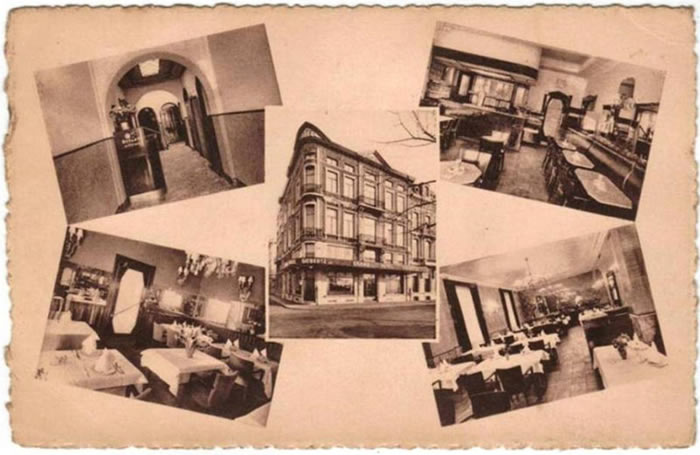
Yesterday Viv took charge of the battalion, and Colonel James left for England.
NEXT >>


